Archaeologists discovered a well-preserved brick-chambered tomb from the Southern Song Dynasty (1127-1279) in Tuibaojing village, Luodian town, Jinhua, Zhejiang, local media reported on Jan 27.
"According to the burial objects, this tomb belonged to a wealthy civilian in the Southern Song Dynasty," said Xu Zhengchen, a staff member at the Jinhua Institute of Cultural Relics Protection and Archaeology.
The structure of the tomb, the excavated objects and the overall arrangement all reflect the unique funeral culture of Jinhua and provide important archaeological materials for the study of the tomb structure and funeral culture and customs of Jinhua and the Song Dynasty (960-1279).

A clay pot for rice was excavated from the tomb. [Photo/jhnews.com.cn]
Burial objects in the tombs of the Song Dynasty usually show the preferences of the buried person during his or her lifetime. Archaeologists found bronze candlesticks, porcelain covered bowls and porcelain incense burners in the east room.
More than 200 copper coins in the east room of the tomb were arranged to form the characters changming (meaning "longevity"). Xu explained that it was another example of the custom of laying money for burial in the Zhejiang area.
In addition, 56 scattered copper coins were found on the floor in the west room of the tomb, and it is speculated that the buried person was 56 years old when she died.